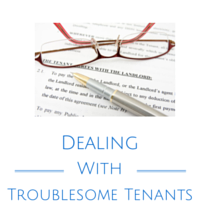Dealing with Troublesome Tenants

We all know that the best way to deal with troublesome tenants is not to let to them in the first place. It is true that your screening process, credit checks and references should be able to sift out the good tenants from the bad, but we have all experienced a situation where an initially good tenant turns bad.
Knowing how to deal with troublesome tenants is therefore a crucial part of making a successful job of property letting. Even if you’ve never had difficulties with your tenants before, you never know when you might be challenged.
Knowing Troublesome Tenants
Unfortunately, it’s a reality that some landlords just don’t get on with some tenants. The letting business can be quite personal, and you can very quickly become acquainted with bad habits or lifestyle choices which you disagree with.
However irritating this may be, it is very different to having a tenant who is a threat to your business. Troublesome tenants might be non-payers, they might cause damage to your property, or they might be anti-social, but it’s important to recognise the difference between tenants who you dislike and tenants who are a genuine problem.
Don’t Turn to Eviction Immediately
The first thought of many landlords upon realising a tenant has caused a problem is eviction. While you can legally evict your tenants for any reason if you are past the initial six month period of an AST, or you are on a rolling contract, it doesn’t always make business sense.
Eviction leaves you with a serious danger of having to financially cover a void period and the problem of finding new tenants. You may also find that evicting tenants without serious grounds or an obvious breach of contract could leave you with a dent in your reputation. Word can quickly get around about an unfair or unwarranted eviction.
Communicating with Troublesome Tenants
It’s key to try to talk to your tenants at the first sign of any problems. Plenty of issues are dealt with by a frank conversation about a specific problem that has only happened once. It might also be that a late rent payment was simply lost through a bank error, so don’t make waves over a situation you don’t fully understand.
When discussing personal or private issues with tenants, it’s important to keep a business case in mind. Landlords often struggle to address issues such as poor personal hygiene, but you need to state that this is causing damage to your property to avoid any personal tensions. Usually this will be much better understood and accepted.
Persistent Offenders
Unfortunately there are some tenants who simply don’t stop after a frank conversation and seem to just ignore your requests. If this is the case it might be time to start considering eviction procedures. Usually, a formal warning about a particular type of behaviour, written if possible, will help to address a problem and the threat of eviction itself can be quite powerful.
Remember that if you do threaten your tenants with eviction you need to be sure you can back up this threat. Whatever your problem is, set a deadline by when it must be solved and arrange an inspection for this time. This shows your tenants that you are serious and may help to change their ways.
Criminal Activity
Some troublesome tenants are bad for your business and peace of mind, however there are also those that are actually undertaking criminal activity on your premises. It’s unlikely you’ll find anything too sinister, but as a landlord you have a responsibility to report any criminal activity to the police.
Remember that criminal activity doesn’t have to be a large scale operation. Personal drug use, drug farming or dealing, domestic abuse, illegal pet breeding or unlawful possession of firearms are all criminal activities that you need to address head-on. Usually it’s wise to seek advice from the police before talking to your tenants to avoid putting yourself in any danger.
Eviction Proceedings
If you have reached the end of your tether, the only place left you can turn is eviction. When it comes to eviction, there’s a difference between a standard eviction which will usually require that you give your tenants two months notice, and an eviction for breach of contract where your notice may be reduced to two weeks.
Remember that these limits are minimums, and you may not wish to evict your tenants immediately. Not only is it wise to allow yourself enough time to find a new tenant, but it’s sensible to be reasonably accommodating to your tenants’ needs. Throwing your tenants out a week before they’re due to move into a new property will not be appreciated, and may cause you more trouble should your tenants decide to withhold a final rent payment or cause damages on departure.
Unfortunately, troublesome tenants are just a fact of life for landlords, so knowing how to deal with them appropriately and reasonably is something that every landlord should learn.


